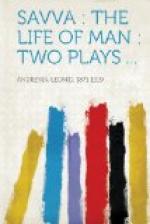—How poor they are! Look, they haven’t even a single spare chair.
—And no curtains in the windows.
—And no pictures on the walls.
—How poor they are! All they eat is hard bread.
—And all they drink is water, cold water from the spring.
—They don’t own any clothes at all except what they have on. She always goes about in her rosy dress with her neck bare, which makes her look like a young girl.
—And he wears his blouse and loose necktie, which makes him look like an artist, and makes the dogs bark at him.
—And makes all the respectable people disapprove of him.
—Dogs hate the poor. I saw three dogs attack him yesterday. He beat them off with a stick and shouted: “Don’t you dare to touch my trousers; they’re my last pair!” And he laughed, and the dogs flung themselves at him and showed their teeth and barked viciously.
—I saw two respectable people, a lady and a gentleman, meet him on the street to-day. They were terribly frightened and crossed to the other side. “He’ll ask for money,” said the gentleman. “He’ll kill us,” piped the lady. From the other side of the street they looked back at him and held on to their pockets. He shook his head and laughed.
—He’s such a jolly good fellow.
—They’re always laughing.
—And singing.
—It’s he who sings. She dances.
—In her rosy dress, with her little bare neck.
—It does one good to look at them. They are so young and wholesome.
—I am sorry for them. They’re starving. Do you understand? They’re actually going without food.
—Yes, it’s true. They had more clothes and furniture, but they sold every bit, and now they’ve nothing more to sell.
—I know. She had such pretty earrings, and she sold them to buy bread.
—He had a beautiful black frock-coat, the one in which he was married, and he sold that too.
—The only thing they’ll have left is their engagement rings. How poor they are!
—That’s nothing. I was once young myself, and I know what it is.
—What did you say, grandpa?
—I said it’s nothing, nothing at all.
—Look, the mere thought of them makes grandpa want to sing.
—And dance.
[They laugh.
—He is so kind. He made my boy a bow and arrow.
—She cried with me when my daughter was ill.
—He helped me mend the rickety fence. He’s strong.
—It’s nice to have such good neighbors. Their youth warms our cold old age. Their jolliness drives away our cares.
—But their room is like a prison, it’s so empty.
—No, it’s like a temple. It’s so bright.
—Look, they have flowers on the table, the flowers she picked on her walk in the country in her rosy dress with her little bare neck. Here are lilies-of-the-valley. The dew hasn’t dried on them yet.




